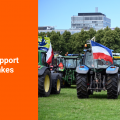
"Why on earth would you still be unkind?"
With the #Doeslief campaign, SIRE (Stichting Ideële Reclame) called on Dutch people last year to treat each other more kindly and respectfully. SIRE exposed everyday incivility using striking statistics. For example, in 2018, 146,571 swearing tweets contained the word cancer - is that possible? #Doeslief was intensively picked up and led not only to awareness, but also to behavioral change and social initiatives. That is why the campaign has a chance to win the Issue Award this year, which will be presented on January 23 in De Balie. We spoke to SIRE director Lucy van der Helm in the run-up to the award ceremony about the success of the nominated #Doeslief.
Why did SIRE launch a campaign about unkind behavior last year?
'We always think of our topics based on a gut feeling. That told us that the Netherlands is hardening and polarizing. The Dutch see this themselves: almost 90 percent of them think we can be nicer to each other. This campaign is a mirror of our times, which is why it was so successful.'
What is the reason for the success of #Doeslief?
'The biggest gain is that many Dutch people – more than half – have taken action in one way or another. Attention was paid to their own behavior, others were spoken to for unkind behavior, the hashtag was used and there was a lot of discussion about the subject. This awareness is important, because people often do not even realize their own unkind behavior. While being nice is so simple, and it also makes you feel good. Behavioral change for, for example, less alcohol consumption or healthier eating requires greater commitment from people. Being nice is a small effort. Then why on earth would you still be unkind?'
How do you explain that this campaign has reached so many Dutch people?
'First of all, it is a good subject that is very much alive in society. In addition, the simple but strong '#Doeslief' is so recognizable and very easy to use, both offline and online. The threshold was therefore very low to do something with it. Finally, the heavy media involvement ensures enormous visibility for the campaign.'
In the research prior to the campaign you noted something striking: On average, people find their own behavior much more sociable and nicer than that of others. Where does that incorrect assessment come from?
'We actually see that in every study. On average, we always estimate our own behavior better than the behavior of someone else. We call that moral superiority. So it is not surprising that people like themselves above average. #Doeslief is not only used to address others, but also invites you to look at your own behavior.'


